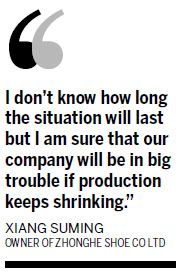SME manufacturers hammered by European economic slump
Updated: 2012-08-16 11:06
By Yu Ran in Shanghai (China Daily)
|
||||||||
Business owners pessimistic as costs increase, debt crisis continues
Europe's protracted financial woes are making life a lot tougher for Chinese exporters.

Falls of 20 to 30 percent in orders and order values have become common across the small and medium-sized manufacturing sector in the Yangtze River Delta, for instance, as many struggle for survival by cutting expenses, laying off workers, shutting down assembly lines, and shortening working hours.
It is still not entirely clear how many businesses are defaulting on repaying loans from commercial and private lenders.
In Zhejiang province, dominated by manufacturers and exporters of traditional products such as textiles and shoes, times are equally tough, as the global trading environment continues to toughen.
Xiang Suming said he hasn't stopped worrying about his company since last year when the European sovereign debt crisis first exploded in Greece, and then spread to neighboring countries.
"The number of orders has kept dropping since the middle of last year.
"I had to cut the workforce by 10 percent to maximize efficiency and minimize expenses," said Xiang, the owner of Zhonghe Shoe Co Ltd in Taizhou, Zhejiang province.
He added that increasing labor and raw material costs in China have added to the troubles caused by the debt crisis, resulting in a slump in profits at his company.
He expects his negative earnings growth to continue, and sees no immediate end in sight to the suffering, predicting profits to slump 90 percent on last year.
"I don't know how long the situation will last but I am sure that our company will be in big trouble if production keeps shrinking," he said, adding that one of his three productions lines has already been shut down.
Shen Zhiming, the manger of Zhejiang Xinghui Textile Co Ltd, paints a similar picture for his business, after choosing to cut jobs and temporarily changing shift patterns for the remainder of his workforce.
"In the first three months, we shortened working hours to six per day, and only four days per week, paying workers a daily salary of 100 yuan ($15.70)," said Shen.
The company has also decided that the only viable way to cut costs and make up for the shortfall in export orders, was to shift 40 percent of its focus onto high-end, own-brand products for the domestic market.
Elsewhere, businesses report that in an attempt to increase profits, they have asked European customers to pay in US dollars.
"I've tried sending quotations to my Italian clients in dollars instead of euros since the end of May because the unstable economic environment in Europe is getting worse," said Ye Fang, the owner of Zhejiang Michele Lingerie Co Ltd.
"There are still certain clients who don't agree, but I really need to avoid taking the risk of any sudden appreciation in the euro, which I feel could occur anytime, without notice," he added.
Any tightening in capital controls or cash flow in Europe, because of the crisis will hammer his Italian business, he said, and already some clients have started to bargain on price to minimize their own costs.
For some smaller manufacturers in danger of missing their targets, changing their product lines altogether is another option.
For instance, Ye Shuhui, manager of Ningbo Jinfan Toy Co Ltd in Zhejiang province, said his overall profits are expected to be at least 5 percent less than last year as a direct result of plummeting overseas demand.
"Since the beginning of the year, total orders have dropped about 20 to 30 percent, mainly from European countries, and I expect those to keeps falling."
Previously a huge advantage for the Chinese toy industry was the country's lower cost of labor and material, but Ye said he is now considering switching production to high-tech products such as electronics instead, to target the European and US markets.
"If I fail to make any money by the end of this year, I'll have to give up with this industry and target higher-profit goods," said Ye.
As with any downturn, there are inevitably casualties - companies unable to find an alternative to fill the lost revenues.
Lin Hai, the owner of Wenzhou Zuoyou Shoe Co Ltd, closed his factory earlier this year. "I've been in the shoe exporting business for a dozen years but I was forced to quit. I simply didn't have the money to survive," he said.
The little profit he was making was being to used to the pay his workers, buy raw materials, and cover the normal day-to-day bills in running his factory.
Lin's company started losing money in 2009, and he gave up after a three-year struggle.
"Fewer businesses are willing to take the risk of entering or even staying in, the manufacturing industry any more," he said. "Business is fading a lot faster than many of us expected."
yuran@chinadaily.com.cn

 Relief reaches isolated village
Relief reaches isolated village
 Rainfall poses new threats to quake-hit region
Rainfall poses new threats to quake-hit region
 Funerals begin for Boston bombing victims
Funerals begin for Boston bombing victims
 Quake takeaway from China's Air Force
Quake takeaway from China's Air Force
 Obama celebrates young inventors at science fair
Obama celebrates young inventors at science fair
 Earth Day marked around the world
Earth Day marked around the world
 Volunteer team helping students find sense of normalcy
Volunteer team helping students find sense of normalcy
 Ethnic groups quick to join rescue efforts
Ethnic groups quick to join rescue efforts
Most Viewed
Editor's Picks

|

|

|

|

|

|
Today's Top News
Health new priority for quake zone
Xi meets US top military officer
Japan's boats driven out of Diaoyu
China mulls online shopping legislation
Bird flu death toll rises to 22
Putin appoints new ambassador to China
Japanese ships blocked from Diaoyu Islands
Inspired by Guan, more Chinese pick up golf
US Weekly

|

|







